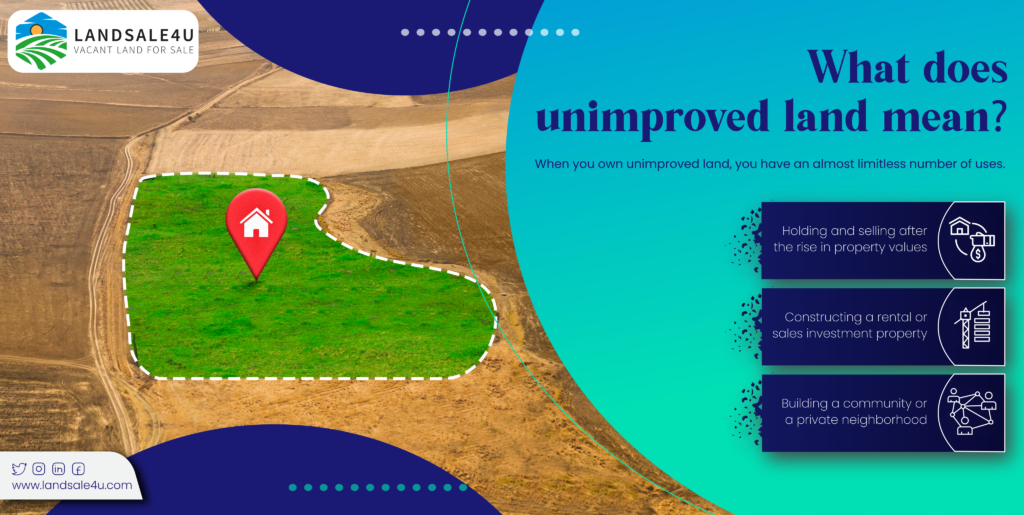When you own unimproved land, you have an almost limitless number of uses. However, it’s crucial to understand what raw, or undeveloped, property is, how you may use it, and how to acquire it before looking for the ideal plot of land, creating designs, and breaking ground.
Table of Contents
Unimproved Land: What Is It?
Unimproved land, often raw land, is an empty space devoid of structures, roadways, or even public services. In other words, land that does not have amenities like power, water, telephone, and, in certain situations, road access is referred to as unimproved property. Unimproved property frequently consists of expansive, open areas that can be used for farming or for future residential or commercial buildings. The unimproved property requires numerous zoning, easements, and other approvals before construction may begin. Unimproved land is a cost-effective choice for buying real estate for your future house, company, or farm due to the absence of services. Undeveloped or unimproved land is frequently available in rural locations off county highways and might be the site of your future home. There are other additional uses for it as well, such as:
- Holding and selling after the rise in property values
- Constructing a dream home
- Constructing a rental or sales investment property
- Building a community or a private neighborhood
- Creating a park and other space to support your neighborhood
As a result, your decision to use the land will determine whether you should invest money to construct an unimproved property or not.
Why should you invest in unimproved land?
- Flexibility: You can use or build anything you want on undeveloped property. As long as your project complies with local zoning restrictions, you may choose to utilize it the way you like and personalize it to your precise requirements. You won’t have to argue about what is a deal-breaker and what you can “live with” because nothing is on the property.
- Lower Maintenance Costs: Purchasing land without any structures implies there will be less maintenance associated with it. The typical cost of house ownership includes upkeep and repairs for things like appliances and important home systems. These can often add up to the home’s purchasing price. There are no HVAC, plumbing, or roof issues on undeveloped land. The land itself is all that needs to be kept up. However, one will need to maintain their finances by paying property taxes and insurance.
- Reduced competition: An undeveloped property may be less competitive to acquire than a standard single-family home when it comes to buyer demand. Many purchasers seek properties that they can move into immediately. If you have the time to wait, buying land and avoiding the competition may be a wise choice given the current state of the property market, which is characterized by strong demand and low inventory.
- Possibility of Return on Investment: We have discussed before that land is a limited asset. Therefore, the price of land might rise over time as the population increases and available space becomes more restricted. Land that hasn’t been developed might make a good investment.
How to Buy Unimproved Land?
Search for the Right Land: Finding out how you want to use the property is the first step. Then, you’ll need to go through available land to choose which property would best fulfill that demand.
Following are some other crucial aspects to think about in addition to accomplishing the stated purpose:
- The ease to access the property
- Access to utilities and connectivity
- Local zoning regulations and property limitations
- Time and financial resources required to prepare the land
- Proximity to other buildings or properties that may affect or enhance the value of the property in the future
Perform the required tests and surveys: Do not trust the seller’s claims. Instead, commission an expert to survey the property. The results will show you the location of the property lines, any easements that may exist, their locations, and any encroachments on the land.
Additionally, you should have environmental testing performed to look for pollutants in the soil.
Request a Land Loan: You must apply for a land loan, more precisely a raw land loan, if you require money to purchase the undeveloped property. Because it is a riskier loan, it could have higher interest rates and a substantially larger down payment demand. The land has not yet been developed, hence it cannot be developed.
Additionally, getting funding could be more difficult if the lender has no real investment to make. Make sure you are proactive when applying for a land loan and have a strong, thorough strategy for what you’ll accomplish with the property to demonstrate to the lender the investment possibilities.
However, these processes can be completed without putting much effort.
Get in touch with experts at www.landsale4u.com and they will provide you with multiple land options from which you can opt for.
Moreover, all these lands have been verified and tested by experts.
Want to know more? Connect with us today.

